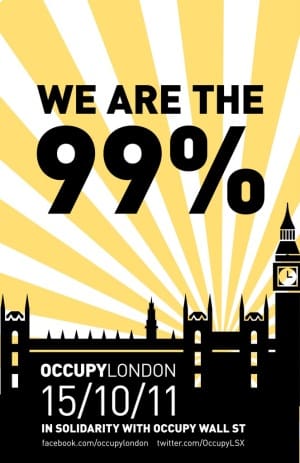Ahead of their mass action tomorrow, we talk to the enigmatic Occupy London Stock Exchange movement
For three weeks the lower Manhattan financial district of New York has been clogged with protestors. The Occupy Wall Street protest has attracted thousands of protestors, several hundred of whom have been camped out permanently. Nearly 800 protestors have been arrested.
Copycat demonstrations have sprung up in across the US. In Boston a protest is ongoing, marred by arrests and accusations of police brutality. Other major demonstrations have taken place in DC, LA and Chicago.
Tomorrow, Saturday 15 October, it is London’s turn. The Occupy London Stock Exchange (Occupy LSX) movement will be congregating en masse at St Paul’s Cathedral.
Numbers attending are hard to prediction, though more than 4,000 have posted their intention to attend on Facebook.
But who are the protestors? What do they want? And should the mayor be stocking up on tear gas and riot shields?
LondonlovesBusiness.com got in touch with Naomi Colvin, a prominent supporter of Occupy LSX, and did our best to get some answers.
What are you protesting about?
It is about people claiming back power and the right to discuss economic and political matters, whereas before they felt a bit disenfranchised. Of course, feeding into that as well is the fact that the financial crash happened in 2008. The ramifications in some ways are only really beginning to be felt now in terms of spending cuts.
Does the movement have any specific demands?
The way these occupations work, and have worked even with what was happening in the Middle East at the turn of the year, is that people organise into committees or general assemblies, which is the main decision making organ of the occupation.
This is what is happening in New York. Every night they have a General Assembly. And if any specific demands are to be emerge out of Occupy London those will be agreed by a General Assembly – so it would be a bit previous of me to give any.
What sort of things would be proposed?
Again, that very much depends on who comes to the General Assembly and what they want to talk about. So it will be interesting to see what comes up. I think it is fair to say there is a general interest in how the financial crisis happened, who is paying for the fall out, and whether adequate provisions are being put in place for them to happen again.
These are technical issues. Examining the roots of the financial crisis takes a forensic examination. How can you do that if thousands of people turn up to an event?
It may be hard to hold learned discussions amongst thousands of people. But speaking personally, I’m not sure that the broad issues are that complicated. How did this happen? How can we stop this happening again? And if there are ways of doing this and they can be done, then why haven’t they been done?
I know a lot of what happens in the financial world is very complicated, but we are led to believe that the space where politics interlocks with economics is it terribly, terribly complicated and ordinary people can’t understand it. And I think, in a sense, this can be used to disenfranchise people.
What about violence? Should we be nervous?
Everything I have seen so far leads me to believe that we are very serious about the issues, and we want to deal with things in a peaceful conciliatory manner. That almost goes without saying.
Who are the leaders of Occupy LSX? Or is it a movement without hierarchy?
We don’t have a hierarchy. There is a group of people working quite hard on things at the moment, but we got involved by attending one of the planning meetings which were available to anyone who wanted to come.
It has been quite inspiring seeing how people have just got together and divided themselves into groups, allocated themselves tasks and just got on and done it. Seeing how that works is really inspiring. It works really well for what we want to do at the weekend and beyond.
What do you want people in the City to do? If the board of Goldman Sachs or the chief executive of RBS reads about this, or walks past the protestors on Saturday, what advice would you give them?
It is a protest in some sense, but it is worth saying that it is about creating a space where people can discuss. Even though we talk about the 99 per cent, it is not the 99 per cent against the 1 per cent.

I would hope that that the chairman of Goldman Sachs (and this may be a little optimistic!) would feel he could have a look at what is going on and maybe even join us at some point. Maybe answer questions.
That is the great thing about Occupy London. It is to have a free discussion in a place where those opinions are never usually represented.
What happens after tomorrow?
If is down to the General Assembly what to do. We have no defined plan as to whether we stay. We have no defined end game.
Thanks, Naomi Colvin, for your time.
**
So what can we at LondonlovesBusiness.com and you out there deduce from Colvin’s answers about Occupy LSX? Well, Colvin stressed to me that the protest isn’t inherently capitalistic, anti-banking, or anti-anything.
In fact she states that in her personal opinion: “Banks are a necessary part of the economy. And people need mortgages to buy houses, and current accounts are very useful to all of us, those of us who are lucky enough to have pensions.” Reassuring stuff to City professionals.
So what we can expect on Saturday? Well after weeks of discussion and protest the Occupy Wall Street movement still has not agreed on demands. If anything, the variety of opinions and the lack of a hierarchy and lack of voting mechanism makes it almost impossible to formulate demands. So the protest keeps going.
As the late Brian Haw proved, once these things get going they can prove rather hard to stop.





Leave a Comment